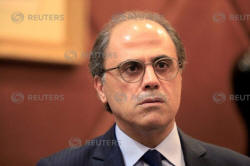IMF not changing Saudi recovery forecasts after
Khashoggi affair: official
 Send a link to a friend
Send a link to a friend
 [November 13, 2018]
DUBAI (Reuters) - The International
Monetary Fund is not changing its forecasts for a recovery in Saudi
Arabia's economy following the furor over the death of Saudi journalist
Jamal Khashoggi, a senior IMF official said. [November 13, 2018]
DUBAI (Reuters) - The International
Monetary Fund is not changing its forecasts for a recovery in Saudi
Arabia's economy following the furor over the death of Saudi journalist
Jamal Khashoggi, a senior IMF official said.
Asked whether the IMF felt a need to re-examine its expectations for the
economy since the Khashoggi affair erupted, Jihad Azour, director of the
Middle East and Central Asia department at the Fund, said it did not.
"What would have an impact is how oil prices will have moved going
forward, and a certain number of other indicators like the pace of
fiscal adjustment and the reforms that Saudi authorities will implement
going forward," Azour told Reuters this week.
"The prospect for the Saudi economy for the next year is showing
continuous growth, led by the increasing oil price as well as the
increase in oil output, in addition to improvement in the non-oil
sector."

In a report on the regional economic outlook, the IMF said higher oil
prices as well as efforts to boost non-oil revenues, such as the
introduction of a value-added tax, had given the Saudi government room
to spend more to boost economic growth.
"The available fiscal space provides the opportunity to temporarily
adopt a modestly expansionary fiscal stance..." the report said.
Before Khashoggi's murder on Oct. 2 in the Saudi consulate in Istanbul,
the IMF predicted Saudi gross domestic product would expand 2.2 percent
this year and 2.4 percent in 2019, after shrinking 0.9 percent last
year.
The Khashoggi affair threatens to damage relations between Western
governments and Saudi Arabia, possibly prompting them to impose
sanctions on Riyadh or on Saudi individuals.
[to top of second column] |

Jihad Azour, the IMF's
Director for the Middle East and Central Asia, speaks during an
interview with Reuters television in Beirut, Lebanon, July 12, 2018.
REUTERS/Jamal Saidi/File Photo

Last month, IMF managing director Christine Lagarde was one of more than two
dozen top officials and Western executives who canceled their attendance at a
big international investment conference in Riyadh in the wake of the killing.
It is not clear, however, that the affair will actually reduce foreign
investment in Saudi Arabia over the long term; many Western companies sent
lower-level executives to the conference and business talks proceeded on the
sidelines.
"It's very difficult to tell how this could impact overall investment in the
long run. We saw some sell-off on the equity market but it was for a short
period," Azour said.
Foreign investors have sold a net $1.9 billion of Saudi equities in the five
weeks since Khashoggi's death, stock exchange data shows. But the selling has
tapered off in recent weeks, totaling just $13.1 million last week.
In its report, the IMF said Saudi Arabia's financial account was improving
partly because of capital inflows following decisions by MSCI and FTSE Russell
to include Riyadh's market in their emerging market indexes.
(Reporting by Andrew Torchia; Editing by Mark Heinrich)
[© 2018 Thomson Reuters. All rights
reserved.] Copyright 2018 Reuters. All rights reserved. This material may not be published,
broadcast, rewritten or redistributed.
Thompson Reuters is solely responsible for this content.
 |